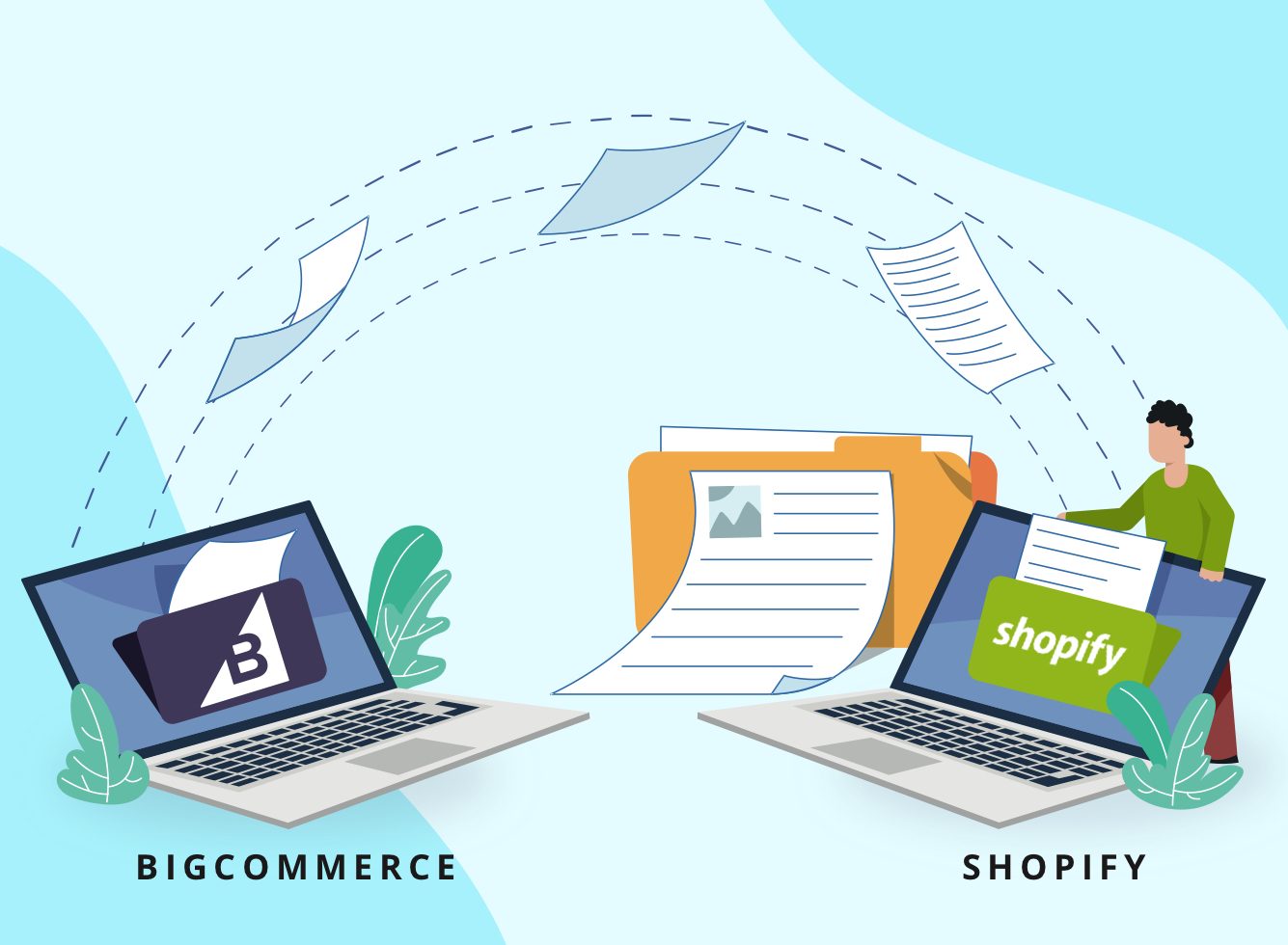BigCommerce to Shopify Migration: An Easy Guide

eCommerce is a rapidly evolving ecosystem with new platforms and technologies emerging all the time. There are a few big names that have become industry standards, which includes Shopify and BigCommerce, among others. As two prominent eCommerce platforms, merchants often compare BigCommerce vs Shopify, with some deciding to make a switch to the latter.
So, what’s the difference between Shopify and BigCommerce? Read on to learn more.
The Differences Between Shopify and BigCommerce
Shopify is a leading eCommerce platform used by over 1.75 million sellers. It’s known for its user-friendly interface, extensive app store, and robust features. Shopify also offers a wide range of integrations, making it easy to connect your store to the tools and services you need to run your business.
BigCommerce is another popular eCommerce platform, powering over 60,000 stores. BigCommerce is a bit more technical than Shopify, but it also offers a wide range of features and integrations. The platform is also known for its scalability, which makes it a good option for growing businesses.
The developers behind these powerful platforms are always working to improve the user experience and offer more features to store owners. But with the release of updates and new features, there might come a time when you feel that your current platform is not offering the same level of flexibility and functionality as its rivals.
If you decide to migrate from BigCommerce to Shopify, then you might be wondering where to start. Read ahead to find out how you can make the Shopify migration process as smooth as possible.
11 Reasons to Make the Switch from BigCommerce to Shopify
Shopify to BigCommerce migration does happen, but BigCommerce to Shopify migration is generally more common. Here are a few of the reasons why merchants are choosing to replatform their stores from BigCommerce to Shopify.
User-Friendly Setup
Shopify is designed to be user-friendly, even for those who are not tech-savvy. The platform offers a simple and straightforward setup process, and it’s easy to add products, set up shipping, and accept payments.
Unrivalled Scalability
Shopify is a highly scalable platform, which means it can grow with your business. If your business starts to boom, you can upgrade your plan and add more features and functionality as needed.
Online Store 2.0
Shopify’s platform is constantly evolving with new features and updates being released on a regular basis. Online Store 2.0 is a complete revamp of the Shopify platform, and it includes new features such as product filtering, automatic image resizing, and much more.
Headless Possibilities
Shopify Hydrogen is the platform’s answer to headless commerce. Shopify migration allows you to take advantage of headless architecture, which means decoupling the frontend of your store from the backend. This gives you more flexibility when it comes to design and development.
Unparalleled UI Flexibility
Shopify’s platform is highly customizable, which means you can create a unique shopping experience for your customers. After Shopify migration, you can use the theme store to find a pre-built theme that suits your needs. Alternatively, you can hire Shopify developers to create a custom theme for your store.
Excellent Customer Support
If you ever run into any issues with your store (or during Shopify migration), Shopify’s customer support team is always on to offer assistance. You can contact them 24/7 by phone, email, or live chat, ensuring you always have somewhere to go if you need help.
Incredible Performance & Speed
Shopify is known for its excellent performance and speed. The platform is built on a solid technical infrastructure, which means your store will load quickly, even if you have a complex site structure and lots of traffic.
Superior Mobile Experience
Mobile commerce is crucial for any eCommerce business, and Shopify offers a superior mobile experience. All of Shopify’s themes are responsive, meaning they will adjust to fit any screen size. Shopify also offers a dedicated mobile app, which makes it easy to manage your store on the go.
Extensive Choice of Payment Gateways
Your payment gateway is one of the most important aspects of your eCommerce store, and Shopify offers a wide range of choices. The platform supports over 100 payment integrations globally to ensure you can find a payment gateway that’s right for your store.
Transparent & Flexible Fee Structure
Shopify offers a transparent and flexible fee structure. There are no hidden fees, and you only pay for the features and functionality you need. If you migrate from BigCommerce to Shopify, you can also save money by paying annually or biannually, which gives you a 10% discount or 20% discount respectively.
SEO-Friendly Design
Search engine optimization is vital for any eCommerce business, and Shopify’s platform is designed with SEO in mind. The platform offers clean and well-structured code, which makes it easy for search engines to index your site. Additionally, Shopify’s themes are designed to be SEO-friendly with features such as built-in metatags and social sharing buttons.
BigCommerce to Shopify Migration in 3 Easy Steps using the Store Importer
The best way to migrate your store from BigCommerce to Shopify is to use the Store Importer app. Using the Store Importer app, you can import your products, customers, orders, and blog posts from BigCommerce to Shopify.
Step 1: Export Your Data from BigCommerce to Shopify
The first step in a Shopify migration is to export your data from BigCommerce. This includes your consumer, product, and order history. After you finish exporting, you will be able to download CSV files containing your data; you may then import it into Shopify using these CSV files.
Exporting Product Data from BigCommerce to Shopify
When you import products from BigCommerce to Shopify, remember to export additional product and variant information in addition to complete product data.
- Via the BigCommerce dashboard, click Products and choose Export.
- Go to Export Template and File Format Options, click Default, and then press Continue.
- The Products dialogue box will appear, and you can click Export my Products to a CSV file and then press Close. This will save a CSV file of your product data to your computer.
- Underneath Export Template and File Format Options, click Bulk Edit and then press Continue.
- Choose Export my Products to a CSV file and then you can press Close. This action downloads another CSV file containing additional product details and variant data to your computer.
Exporting Order Data from BigCommerce to Shopify
- Go to your BigCommerce dashboard, select Orders, and then Export.
- Go to Export Template and File Format Options, click Default, and then press Continue.
- The Orders dialogue box will appear, and you can click Export my Products to a CSV file and then press Close. This will save a CSV file of your order data to your computer.
Exporting Customer Data from BigCommerce to Shopify
- Go to your BigCommerce dashboard, select Customers, and then Export.
- Go to Export Template and File Format Options, click Default, and then press Continue.
- The Customers Export dialogue box will appear, and you can click Export My Customers to a CSV file and then press Close. This will save a CSV file of your customer data to your computer.
Step 2: Import Your Data from BigCommerce into Shopify
While migrating from BigCommerce to Shopify, you can import CSV files generated by BigCommerce into Shopify after they have been exported from the platform.
Steps:
- Click Apps > Store Importer on your Shopify Admin page.
- Go to the Import your data into Shopify page. From here, click BigCommerce from the drop-down menu.
- To import your files, first click Add file under the Upload files heading. You can select as many CSV files as you wish; however, when importing products, be sure to include both the Default and Bulk Edit templates for complete data accuracy.
- Choose Continue import > Import
Step 3: Review your imported data
After your data has been imported during the BigCommerce migration process, take some time to review it. Check things like product pricing, variants, and inventory levels to ensure that everything was imported correctly. If something went wrong, you can add, edit, or delete products and customers manually from your Shopify admin.
Congratulations! You have successfully migrated your store from BigCommerce to Shopify.
A Quick Guide to BigCommerce to Shopify Migration
The process of moving your store from BigCommerce to Shopify is relatively simple, and as outlined above, it can be completed in just a few steps. Now here are a few things to note regarding the migration process.
There are Several Ways of Moving from BigCommerce to Shopify
There are a few ways of going about this, but the most common is to export your data from BigCommerce as CSV files and then import them into Shopify. However, some store owners may find it easier to use a third-party migration service. These services can automate the entire Shopify migration process.
You Can Migrate Most Data from BigCommerce to Shopify
Conveniently, Shopify can import most data from BigCommerce, including products, customers, and orders. Here is a complete list of data that can be migrated:
- Products: This includes information like names, SKUs, full descriptions, status, manufacturers, prices, special prices, stock levels, meta title and descriptions, product variants, images and additional images, and product quantities.
- Customers: This includes information like names, email addresses, billing addresses, and shipping addresses.
- Historical orders: This includes information such as order dates, status, products, prices, quantities, discount prices, tax prices, total prices, shipping costs, comments, customer details, and shipping addresses.
- Gift cards, certificates, and store credits: This includes information like names, coupon codes, types of discounts, and discount amounts.
- Blogs: This includes information like titles, URLs, SEO URLs, authors, and descriptions.
- Pages (shipping policy, contact, and other webpages): This includes things like titles, created dates, URLs, and descriptions.
- Product reviews: This includes information like customer names, titles of the reviews, descriptions of reviews, and ratings.
Points to Remember While Migrating from BigCommerce to Shopify
When moving from BigCommerce to Shopify, there are a few things to keep in mind during the process. Here is a checklist of critical considerations:
- Before migrating from BigCommerce to Shopify, make a full backup of your current store.
- Make sure you migrate your content and products in the required languages.
- Import complete supplier and media information
- Migrate product and category URLs for SEO purposes
- Preserve your site’s SEO rankings by creating 301 redirects
- Export product details along with products variants
- Preserve your order IDs post-migration
- Ensure a smooth transition by migrating your user passwords
- Clear data on your target store before migration to avoid duplication of data
Ready to Migrate from BigCommerce to Shopify?
With this guide in hand, you are now ready to migrate your store from BigCommerce to Shopify. Shopify migration is a big decision, but it is one that can offer your business several advantages.
Shopify is one of the most popular eCommerce platforms for a reason. By migrating to Shopify, you can take advantage of its many features, including its user-friendly interface, a comprehensive set of tools, and scalability. If you are looking for a platform that will allow you to grow your business, Shopify is a great option.
For more information check out our Shopify Migration Services. If you need assistance, hire Shopify developers from a trusted Shopify development agency. You’ll get the benefit of smooth migration with no data loss or significant downtime, while preserving your hard-earned SEO. Contact us today to learn more.





